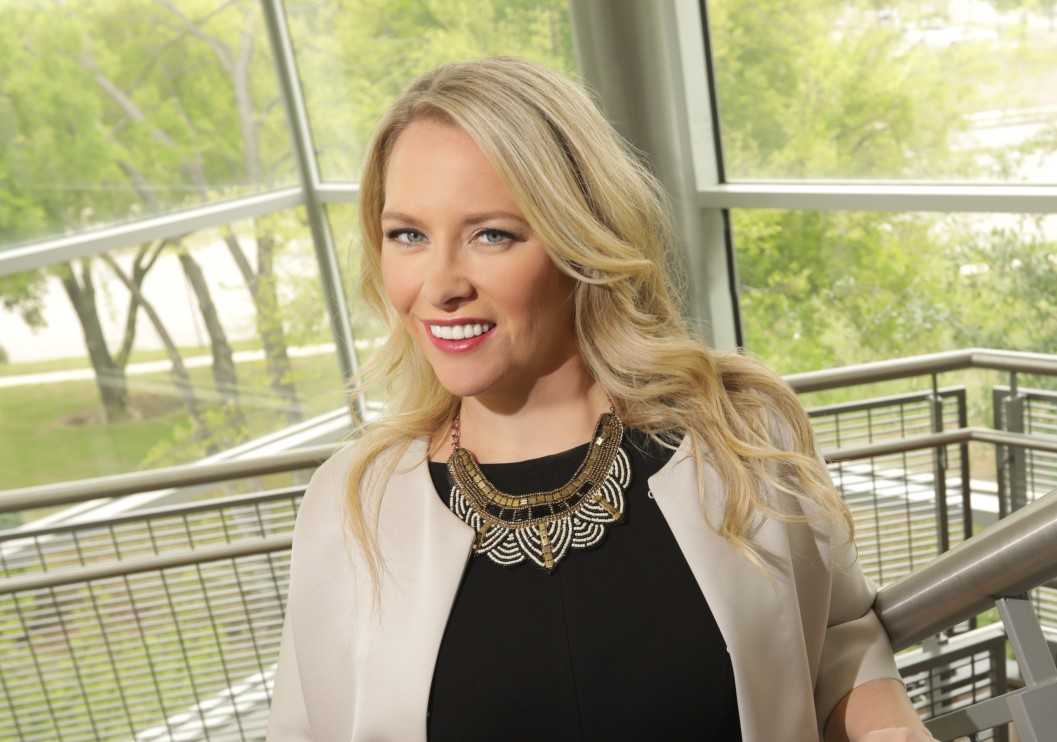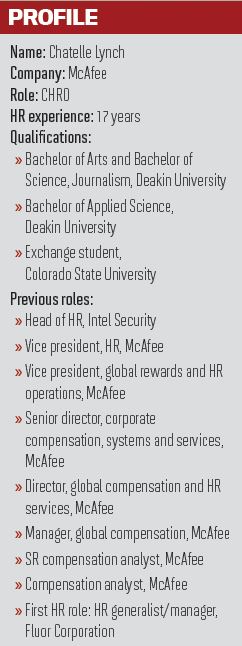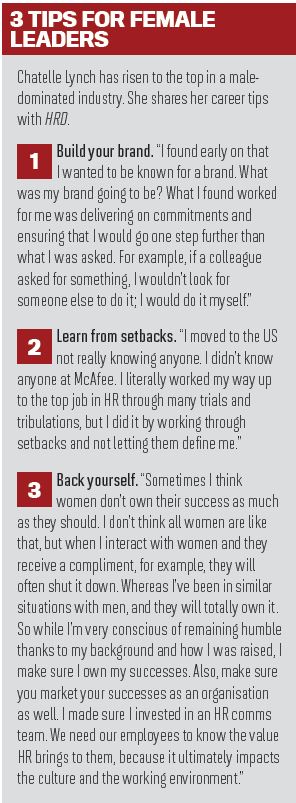
Chatelle Lynch not only heads global HR operations at cybersecurity firm McAfee but was under 40 when she was appointed to the board of the company and is a passionate advocate of attracting more women into technology fields. She chats to Iain Hopkins about her career

Chatelle Lynch not only heads global HR operations at cybersecurity firm McAfee but was under 40 when she was appointed to the board of the company and is a passionate advocate of attracting more women into technology fields. She chats to Iain Hopkins about her career
Using the maxim that HR professionals in 2018 must be business leaders first and HR professionals second, McAfee’s senior vice president and CHRO, Chatelle Lynch, has built her career around not just knowing her organisation inside out but also “knowing the numbers”. Lynch started her career as a compensation specialist and has found that data provides a different level of credibility when she’s dealing with other data-driven individuals. Numbers cut through and ‘talk’ to other professionals, she says.
“Using that data to help explain why HR decisions are made has been invaluable,” Lynch tells HRD. “That’s the language these other professionals speak, so my belief is HR should also speak that language. For example, when you’re trying to hire quickly in a very dynamic and competitive market where there is already a shortage of talent and where people are already under pressure to meet numbers and get roles filled quickly, you want to help people understand that this is not just an HR process designed to slow down what they need to do. Showing them the bigger picture with data is critical. It provides great insights into so many areas.”
Melbourne-born but now Texas-based, Lynch has been a long-standing employee of cybersecurity firm McAfee. She joined the company in 2005 and worked her way up to global head of HR in 2015. Today she leads the HR function at McAfee for 7,500 employees in 50 countries.
During her career at McAfee, Lynch has been involved in various M&As and also a major divestiture – all the while being a working mother of five children. She is a strong advocate for supporting the growth, empowerment and success of women in what remains a male-dominated industry. She reveals her story to HRD.

Chatelle Lynch: I’d always had a fascination with the US, so when I was at Deakin University in Melbourne I applied for a US student exchange program and was accepted. It was just a six-month opportunity, so when I got back to Australia I said, “I want to go back; I’m not done with America yet”.
I wrote to as many companies as I could think of, and the company that accepted me [engineering/construction firm Fluor Corporation] profiled where I’d sit best. They decided to put me in the HR department. At that time I’d just finished my degrees, and I admit I didn’t really know what HR was. The company thought I showed potential, and they put me in an amazing high-potential program. I was able to get rotations through every function in HR over a six-month period. It was great exposure. I fell in love with HR and the ability to influence business decisions through people.
I ended up at McAfee, starting as a compensation analyst. I had a great mentor who recommended I get really good at one or two areas of HR so when you walk into a room no one knows more about that topic than you do. For me those two areas were compensation and M&As. I tried to learn those two areas inside out.
HRD: What is McAfee doing to attract more females into the industry and by extension the company?
CL: There are simply not enough females in the tech industry. There are also not enough females in the pipeline for the tech industry, and if we don’t change that we’re not going to see numbers in tech improve.
We’ve taken a two-pronged approach. Firstly, we are concentrating on the pipelining of diverse talent from early ages. We’ve looked at our processes and the approach we take to the talent market to ensure we’re doing as much as we can on the recruiting side to bring female candidates in front of our managers when we’re recruiting.

As an example, for software and engineering roles in Singapore we want to see five final candidates, and at least two of them need to be female. We’re ensuring there’s a female interviewer as part of the decision about who we bring into the company. We won’t sign off on the hire unless the diversity metrics have been met.
The problem for us is that our recruiters have to work harder in a very fast-moving industry, because it’s not just about finding female qualified candidates; it’s become about finding qualified candidates, period. By 2020 there will be a shortage of two million professionals in cybersecurity. Given the rate at which threats are moving, we’re urging governments, universities and colleges to get more involved, whether that be through more funding or changes to curriculums to groom future cybersecurity talent.
HRD: Can you outline what the WISE Affinity Group is about?
CL: WISE stands for Women in Security, and it’s one of our employee-run networks. We have around 1,000 members in the group globally. Importantly, it’s not just women involved in the group; it’s also men, at all levels. We run mentoring programs, educational classes, and focus heavily on professional development.
WISE provides the opportunity for women to share their experiences. Where we’ve focused on over the last year or so is the men playing more of a role, and encouraging them to see things from the perspective of their wives, their sisters, their daughters. That’s been eye-opening. We’ll continue to ensure it’s not just a female group but pertinent to men as well. We need men in the workplace to help create better understanding and to model the behaviours we want to see.
HRD: This is obviously a far-reaching issue that needs widespread support to make meaningful change. Do you feel there’s only so much one organisation can do?
CL: Working together is important. I know we’re a business and we’re in competition with others, but I feel like the cybersecurity industry knows we have a greater cause, a greater mission. As an industry we’re banding together and doing whatever we can to take things forward to government and education and councils we’ve formed. Our CEO is on these councils, alongside the CEOs of our competitors. I’ve seen some great partnerships formed. There’s more of a focus on it, but we need more funding and more cybersecurity professionals ready for the future – both males and females.